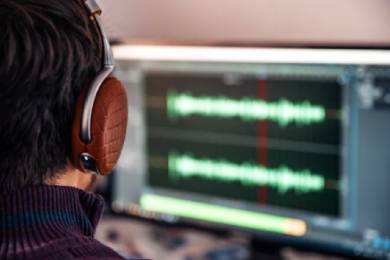Beatmakers and music producers perform two different roles in the music industry but are also linked with one another in the music production process.
The main difference is that a beatmaker creates beats to sell. But a music producer oversees the entire music creation process with the artist until the song is ready for release.
In the rest of the article, I will discuss all that a beatmaker and a music producer works on. I will also discuss everything that differs the works of a beatmaker from that of a music producer. Without further ado, let’s dive right into it!
What Does A Beatmaker Work On?
A beatmaker is someone who creates beats. A beatmaker composes a piece of music from scratch and the process includes numerous instruments, playing drums, and percussions.
Beatmakers typically use either a DAW (digital audio workstation) or MPC to create beats. A DAW requires the beatmaker to use a computer while an MPC is a hardware device that feels more hands-on.
They may also modify music or melodies released previously by other artists to shape them into their creations. The process is called sampling, which may sound easy but it is a skill in itself and a great sense of creativity.
Beatmakers possess the freedom to express themselves as they are not bound to projects for others. Traditionally, a Beatmaker will create the beats for a song and then send them to the artists or producers, completing their role in the process.
Artists or producers will take care of the rest.
What Does a Music Producer Do?
Traditionally, the role of a music producer was to oversee the overall music production process. However now in the modern era, the role of a producer has changed quite a bit.
Now the role of a music producer is someone who pulls out the best in every artist or band they work with and their music. They are the driving force behind every project they take on.
Music producers bend and hammer their way through the pre-production, actual production, recording, and even post-production to bring the most out of every project they are a part of.
They are the ones in charge of bringing the artists and bands together, bringing forth the vision that artists and bands possess in their heads to reality.
What Sets Apart A Beatmaker From A Music Producer?
Now that we have looked at what a beatmaker and a music producer generally work on, we can move on to the actual differences.
There are a few distinct characteristics that make a music producer and a beatmaker completely two different things. Let’s take a look at all the differences between the two professions:
- Specializing in specific genres of music.
- Where a Beatmakers composes, a music producer leads.
- A Beatmaker may sell or give away their works but music producers don’t.
- Oftentimes, Beatmakers will work alone but Music Producers work with others.
- Beatmakers and Music Producers work with different equipment.
Specializing In Specific Genres of Music
One of the major differences between a music producer and a beatmaker is that beatmakers create and specialize in different genres of music. While music producers do not really choose a genre and work with specialized artists to bring out their best.
Although many may think a music producer is generally related to EDM music, they can make any kind of music. From metal, pop, EDM, rap, hip-hop, R&B, jazz to any other genre is within the scope of a music producer.
Where A Beatmakers Composes, A Music Producer Leads
A music producer is a person who supervises or overlooks an artist or band during the recording of their album.
They’ll provide great suggestions for what direction the album should take, how something can improve, and so on. This is why music producers may be comparable to directors as they also serve as a project’s leader.
But a beatmaker is different in every sense as they only make beats. They are composers who sample and play different types of instruments. Drums, percussion, synths, and other kinds of sampled sounds are all laid down by them.
It’s a serious talent that requires a lot of learning and practice to master.
A Beatmaker Sell Their Beat But Music Producers Don’t
It’s common for beatmakers to make beats and sell them based on beat-by-beat to anyone willing to buy. Rappers and other musicians then own the right to utilize the beats in their music.
But this does not necessarily mean that they own the tunes. There is a real industry for this type of service and it only continues to grow over time.
This is quite different from a music producer’s work. They either make music completely for themselves or work together with other bands or artists to work on their music.
Music Producers Work With Others
Beatmakers tend to work alone as all they need to do is produce beats. They can do this at a professional studio or a home studio or simply on a regular PC. After they have made the beats or a pack, they distribute their work via social media or on their websites.
Producers may also hire them to make beats for a song. But the composition is in their own hands.

Whereas a producer generally works with others. When they gain an idea and a vision, they seek other musical artists to execute the idea.
The producer decides what instruments will be included and who they wish to sing the song. They need to communicate with everyone to make sure everything comes together.
But if the producer isn’t doing all the mixing and mastering by themselves, they will seek out the right person for the job. Once the music is ready, they take it to the record labels to release it to the market. Ultimately a music producer will need to work with others to finish producing a song.
Beatmakers and Music Producers Work with Different Equipment
As the jobs are completely different from one another, the equipment a beatmaker and a music producer use are also different.
Beatmakers typically do their work using beat-making software such as FL Studio, Logic Pro, Ableton Live, and others which are referred to as Digital Audio Workstation (DAW).

Beatmakers are also concerned with different other rhythmic elements, including synthesizers, bass, and effects. As a result, they also produce music using keys, MIDI devices, and digital pads.
On the other hand, music producers are the engine that drives a song or an album forward. They are in charge of all of the music’s conception and execution.
And while they may use the same equipment as a beatmaker they also help come up with an initial concept or provide creative ideas to what has been presented to them.

Then they figure out what instruments are required and put together a team of musicians, beatmakers, to make it all work.
Producers are the force that binds a musical project together and brings all the pieces together. They may also specialize in audio engineering, mastering, mixing, and others.
Some even handle the logistics side of things, such as coordinating back-and-forth contact with customers, labels, and artists.
Conclusion
Many roles in the creative industry can sometimes seem vague and confusing as one person can take on different tasks. So if you find it hard to differentiate between a beatmaker and a music producer, I feel you.
Here I have shared the key differences between the two professions.
I hope you are now able to form a clear idea about them. Thank you for reading.


